Peter MALONE
Saturday, 09 October 2021 13:01
Agatha Christie's Poirot: ABC Murders
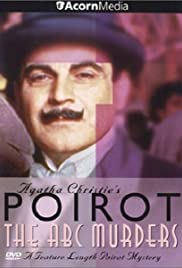
THE ABC MURDERS
A, 1992, 103 minutes, Colour.
David Suchet, Hugh Fraser, Philip Jackson, Donald Sumpter, Donald Douglas, Nicholas Farrell.
Directed by Andrew Grieve.
The ABC Murders is one of Agatha Christie’s best-known novels. It was filmed as The Alphabet Murders during the 1960s by the same company which made the Miss Marple films with Margaret Rutherford. It veered away from details of the novel. An American comedian, Tony Randall, was Poirot with Robert Morley as Hastings.
The BBC made a three-part version in 2018 which kept the core of the plot but veered away in many details, eliminating Hastings, killing off Japp, having what might seem an extraordinary background story for Poirot, played unexpectedly by John Malkovich, as a parish priest during the German invasion of Belgium in World War I, the effect on him raises doubts in his ministry, coming to England and becoming the celebrated detective.
This version is much more straightforward, one of the earliest of the 70 television films with David Suchet as Poirot and Hugh Fraser as Hastings, Philip Jackson as Inspector Japp
Poirot receives letters announcing murders in successive towns, starting with A, B, C, D. And the letters are signed ABC. Poirot investigates each case, challenged by successive letters. He visits the site of each murder, conducts interrogations.
The audience also sees a middle-aged man with an epilepsy background, going to watch thrillers of the cinema, door to door selling of stockings which is the initial clue as to the identity of the killer. After the last murder, the salesman is bewildered and gives himself up to the police. Good performance by Donald Sumpter.
A group of friends of the victims has gathered together to try to solve the case with Poirot and Hastings. Poirot gathers them together, highlights the fact that there is only one murder which benefited those connected – which means that the others were murders arranged to mislead and a chance encounter with the epileptic man led to the plan, the typing of the letters, giving him the typewriter, the stockings, and giving him orders, as if from the stocking company, to go to various locations – where the murders were committed.
1. The popularity of Agatha Christie’s novels? The film versions? With David Suchet as Poirot?
2. This classic status of this book? Other film versions? This version close to the novel?
3. The title, the letters to Poirot, the signature, the choice of the alphabet for the murders? The cover for the main intended murder?
4. Poirot and Hastings, friendship, collaboration and investigation, Hastings return from South America, the crocodile gift, the smell, the place in the apartment? And the final gift and story for Cust? Hastings staying with Poirot – and the washing up and drying up of the plates?
5. The letters, the challenge to Poirot? The wrongly addressed envelope and the consequences?
6. The involvement of Inspector Japp, Scotland Yard, his step-by-step investigations, lack of imagination, support of Poirot?
7. The first murder, the elderly later lady, her German husband and his protests? Her niece, in service, upset? The second murder, the young girl, waitress, her snobby employer, the sadness for her family, her strong-minded sister, the boyfriend, his lack of alibi, his anger? The third murder, the wealthy mansion, his wife and her cancer, her observations of Thora and the visitor? Franklin Clarke, friendly, welcoming, his involvement with the group and their investigations? Thora, the victim and his attraction, possible marriage? The fourth murder, the D, Cust at the film, the stabbing?
8. Poirot, the continued investigations, looking for clues? Hastings and his help? The visits to the various families? Going to Doncaster? Expectations? The races?
9. The question as to who would benefit from each murder? Targeting Franklin Clarke? The group together, the explanation, the recreation of the murders, the typewriter, the letters typed before it was sent to Cust, asking him to be a stockings salesman, each murder?
10. Cust, his mental health, seeing him at the cinema, his discussions with his landlady, going to Doncaster and not Cheltenham, the stockings, the cinema, the knife in his pocket, the blood, report to the police? His being apprehended? In jail, his epilepsy, his lack of memory? The gift of the typewriter, the stockings? His following orders? His mother saying he would be most famous – and the irony of his being innocent, the newspaper wanting interviews with him?
11. The ingenuity of the plot? The investigation? The clues? The solution?
Published in Movie Reviews
Published in
Movie Reviews
Saturday, 09 October 2021 13:01
Mark of the Devil/ La Marca del Demonio
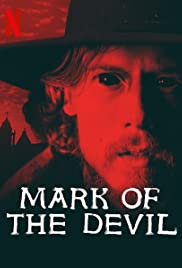
THE MARK OF THE DEVIL/ LA MARCA DEL DEMONIO
Mexico, 2020, 82 minutes, Colour.
Eduardo Noriega, Eivaur Rischen. Nicolasa Ortiz Monasterio, Lumi Cavazos.
Directed by Diego Cohen.
The title and the rough, small-budget style are reminiscent of the range of be horror films produced in Spain, especially in the 1970s. This is a Mexican production, although its star is the Spanish, Eduardo Noriega, who also was one of the producers of the film.
Although the screenplay makes fun of the Hollywood conventions in films, this production is definitely in its tradition, opening with a young boy in paroxysms as a bearded elderly priest performing an exorcism, his peasant parents very concerned. The priest takes the body away for burial but the boy revives in the back of the car, the priest throws him down a cliff and drives off.
The main action of the film takes place 30 years later. There is a focus on a Professor of ancient languages who receives the gift of an ancient manuscript, whose text and images are reminiscent of the Necronomicon. One of her daughters opens the book, suggesting that her other sister, there with her boyfriend, read some of the texts – and there is suddenly a wind and some kind of sense of supernatural presence.
After going out dancing, taking ecstasy, the young woman sleeps for a day and then begins to exhibit ominous signs. The older sister is concerned and discovers that there are no exorcists in Mexico but that a certain priest would be available to do something.
The audience has seen him in action, addicted to heroin, dependent on supply from a mysterious man, always wearing a hat, echoes of spaghetti westerns. He also has strong powers, especially in violent confrontations. It soon emerges that this is the young boy of the opening grown into an adult, exorcised. There is a later flashback to the young boy in the church, the priest who exorcised him hanging crucified in the church. The young priest takes him under his wing.
The priest, Tomas, Eduardo Noriega, goes to visit the disturbed girl, is confronted by the professor and her easy-going husband.
Ultimately, rituals, both parents flung around the room, dying, both sisters becoming haunted. Ultimately, the strange man is able to extract the evil – and the two girls drive away from home.
This is the kind of film that is made specifically for fans of possession/exorcism films, a blend of the serious as well as some tongue-in-cheek over the top characters and effects.
Published in Movie Reviews
Published in
Movie Reviews
Saturday, 09 October 2021 13:01
Crossword Mysteries: Proposing Murder

THE CROSSWORD MYSTERIES: PROPOSING MURDER
US, 2019, 92 minutes, Colour.
Lacy Chabert, Brennan Elliott, John Kapelos, Barbara Niven, Romaine Waite, Genevieve King, Lara Jean Chorostecki, Kyle Buchanan.
Directed by Don McCutcheon?.
The Crossword Mysteries are easy television entertainment, mystery, many clues, many suspects, undemanding.
Once again Lacey Chabert is Tess Harper, responsible for the crosswords in the New York Sentinel. Once again, she has all kinds of connections to the murder victim, employing her aunt Candace to help her in her investigations. And, once again, Brennan Elliott is Logan, the detective investigating the murder and discovering all the links with Tess, reluctantly giving her information, allowing her to pursue her own investigations. And, in the background is John Kapelos as the police chief, Logan’s father.
There is a touch of romance with Logan’s sister and wedding preparations – and a finale at the wedding.
There is a World War II introduction, a robbery of jewellery and a European Castle and the burying of the jewellery in a farm in Connecticut. The murder victim is an academic who is searching for the jewellery, with connections to his grandfather. The range of suspects is in the world of academia, the victim’s rival for tenure, the ex-prisoner who is helping him search for the jewellery, a lecturer who owns an antique bookshop, and his fiancee. There is also his former girlfriend – but she is a red herring.
Easy investigations, some moments of danger, and the unmasking of the murderer.
1. The second in a popular series? Using the same formula? The references to crosswords and clues? Tess and her friendships, links, curiosity, intruding in investigation? Logan and his work, sparring with Tess, collaborating with her? His father as the chief, observing? Aunt Candace and her social connections? The sparring between Logan and Tess, the attraction? The situation, Logan’s sister and the engagement, the photo in the paper, the various preparations, Logan not having anyone to go with – and then the eventual invitation to Tess, and their dancing?
2. The opening, World War II, the stealing of the jewellery, the thief and the shots? The revelation of Kyle’s grandfather, the burying of the jewellery in the property, Lyle using the ring for proposing to Abby? His asking Tess to put the proposal clues in the crossword?
3. Kyle, his studies, pleasant, expecting Abby, the stranger at the door, his death? Logan, Winston, the investigations? Partnership and collaboration? The ceramic knife? Tess and her friendship with Lyle, he showing her the ring?
4. The academic connections? Emory and the rivalry for tenure? Clayton as Lyle’s assistant, work in the library? Christina, her lectures, the antiquarian bookshop? And Bethany as the former fiancee? The plausibility of their all being guilty?
5. The details of Logan, his detective work, connections, interviews, phone calls? Encountering Tess? Exchanging information, reluctantly? Her accompanying him to the farm in Connecticut?
6. Tess going to the library, search for the books, Clayton and his presence? Her return, the threat, the books, the falling bookshelf? Suspecting Clayton? Emory responsible?
7. The discussions with Emory, pleasant, the revelation of his connection with Christina? His knowledge of the situation of the jewels? Christina, her lecture, the bookshop, Tess and the clue about the children’s book, Christina arranging it, trapping Tess in the freezer, her wanting a share of the jewels, driving to Connecticut? The police, the arrest? The collaboration with Emory?
8. Bethany, the surgeon, her background, her alibi, her sending the notes, her resentment? Her being exposed? Bringing the flower to Lyle’s memorial, encountering Tess?
9. Abby, the interrogation, work as a chef, Candace and Tess attending the lecture, Tess getting the knife? Abby being photographed with Clayton? Clayton in the library? Logan following up the photo, place in helping Lyle with the driving, the digging?
10. Tess, the document with the code, her explanations, the example of the book, searching for the book? Lyle’s mother and her identifying the title?
11. Lyle, his lies, one lecture, his research, German codes? The finance, the payment of the farm mortgage? His visit to Connecticut?
12. Abby and Clayton and suspicions? They’re not being involved in the murder? Arranging the money for the last mother and for Abby?
13. The audience seeing the murder, Christina and her motivation?
Published in Movie Reviews
Published in
Movie Reviews
Saturday, 09 October 2021 13:01
Poison Rose, The
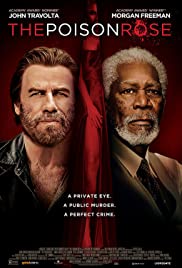
THE POISON ROSE
US, 2019, 98 minutes, Colour.
John Travolta, Morgan Freeman, Brendan Fraser, Famke Janssen, Ella Bleu Travolta, Robert Patrick, Peter Stormare, Kat Graham.
Directed by Francesco Cinquemano, George Gallo.
The Poison Rose is a throwback and something of a homage to the film noir of the past? 21st-century interpretation of the private investigator. Political and social corruption. Drug deals, oil development in the city of Galveston. The setting is 1978. There are echoes of such films as Chinatown, 1977, with its 1930s setting.
We are introduced to a scruffy private investigator by Carson Phillips, played by a bearded John Travolta. He is commissioned to go to Galveston, the city left 20 years earlier after his career as a footballer and a relationship with a woman who subsequently married an oil tycoon (she is played by Famke Janssen). Interestingly, her daughter, Becky, is played by Travolta’s daughter, Ella Bleu Travolta.
Investigating the commission, Carson Phillips goes to an Institute for the elderly, encounters the smarmy doctor (a portly, middle-aged Brendan Fraser). He investigates the doctor’s office, discovers match fixing, as well as drug deals.
Morgan Freeman plays Doc, the power in the city, ever ambitious for power and money. Kat Graham plays his daughter, Rose, a singer in a club which she owns. There is also a football player, a moody man, married to Jane’s daughter. He collapses during a match and dies.
Carson continues investigations despite threats, being pursued by hitmen from Los Angeles, shot at in the football stadium by Doc’s rival drug dealer.
There is something of a twist towards the end in discovering who actually killed the football player.
The film was received well enough as an entertainment but suffered with criticisms by those who felt that John Travolta’s career was coming to an end.
1. A 21st-century film noir? Looking back to the 1970s? The noir of the 40s and 50s? Echoes of films like Chinatown?
2. Los Angeles, the private investigator and offices? Travel to Texas? The city of Galveston? Streets and buildings, the water, the beach? Oil derricks? Clubs? Institution for the elderly? Football stadium? Atmosphere? The musical score?
3. The cast? John Travolta after many years? Morgan Freeman? Brendan Fraser in middle age? John Travolta acting with his daughter?
4. The opening situation, the private investigator, looking ragged, threats? The woman visiting, the open cheque-book, her wanting information about her relation? Carson Phillips reluctant to go to Galveston? His back story?
5. The decision to go? The visit to the Institute, the receptionist and her hesitation, the introduction to Miles Mitchell, his recognising Carson? Carson put off? Waiting? The return, the open spaces, the drug lab? The woman interned and her criticisms? And her later shooting Mitchell? The indications of the buried bodies? Carson and the office, photographing the documents? The hotel, giving the receptionist money, the hitmen also offering money? Cleaning his coat?
6. Going to the club? The introduction to Doc? His daughter, Rose? Her singing in the club? The to-ing and fro-ing between Doc and Carson? The sheriff, Slide? Happy and his surliness? Attacking Carson? Becky outside in the car watching?
7. The football match, Happy and his collapse, death? Carson bribing the coroner and getting the information? Cancer tablets? Seeing Jane, her phone call, their past story, 20 years, her marriage, the death of her husband, oil-rich? The revelation that Becky was his daughter? Her contracting him to protect Becky?
8. The sheriff, controlled by Doc, the past with Carson, pursuing Becky, the only suspect? The motivations – and Happy’s brutal treatment of her? Happy’s liaison with Rose? Carson interviewing Rose? Her affair with Happy? Rose and owning the club, her relationship with Doc?
9. The threats to Carson, the hitmen from LA, the shootout? The sheriff’s attitude?
10. Doc, the interview with Jane, his wanting the oil income, the deal with her? Her not intending to honour it?
11. Lorenzo, the drug deals, the violence, rivalry with Doc? The link with Mitchell? The invitation to the stadium, Lorenzo with the rifle,
being shot by Carson?
12. Slide, the injuries, Carson forcing him to give the information?
13. The initial encounter with Becky, her walking off? Finding out the truth? Coming to him, his protecting her?
14. Memories with Jane, the sexual encounter, the bathroom, the tablets, Jane and her killing Happy? Terminal cancer?
15. Going to the Institute, the confrontation with Miles, the gun, digging up the grave, Carson forcing him to drop the gun, his admiration
for Carson in the past, his telling the truth, his being shot by the woman inmate? Carson, in the drug lab, the shootout, the destruction, the
fire?
16. Carson and Doc telling him he always won? Carson winning? Saying that he was at home, staying with Jane and Becky?
Published in Movie Reviews
Published in
Movie Reviews
Saturday, 09 October 2021 13:01
Message from the King
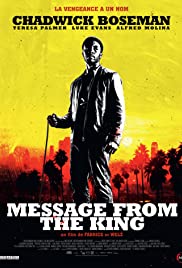
MESSAGE FROM THE KING
Belgium/US, 2017, 102 minutes, Colour.
Chadwick Boseman, Luke Evans, Alfred Molina, Teresa Palmer, Natalie Martinez, Chris Mulkey-.
Directed by Fabrice Du Welz.
Message from the King is an investigative thriller from Fabrice du Welz (the horror film, Calvaire, the Thai- Burma setting Vinyan).
It plays very much like a Los Angeles detective story with touches of revenge. It draws strongly on the various neighbourhoods of the city, seedy as well as affluent.
The difference is that the central character, Jacob King, played by Chadwick Boseman (who had already played Marshall Thurgood in Marshall, James Brown in Get It on, baseball player Jackie Robinson in 42, had appeared once as Black Panther in a Captain America Marvel adventure, and was soon to be catapulted to stardom in Black Panther) arrives in New York for a week to track down his sister. He is from South Africa (strong accent and all).
King follows many leads, makes many contacts, eventually finds that his sister is dead. His feelings are enhanced by many flashbacks to his time as a boy, his happy sister, the young brother who eventually finishes up with Cape Town Numbers Gangs, in prison, dead.
He is helped by a sympathetic woman, Natalie Martinez, and also encounters a prostitute, Kelly, in his seedy hotel. She has a daughter, stacks vegetables, is sympathetic to King. This is a very good performance from Teresa Palmer.
Investigations lead him to seedy drug dealers who are also hitmen on demand. But he also gets a lead to a fashionable dentist, played by Luke Evans, who is all charm and innocence – but King follows him to the mansion of a film producer, Alfred Molina, and uncovers the story behind his sister’s death, her paying off her dead husband’s debts, into prostitution and selling her stepson to the film producer.
King is no slouch in violent confrontations with the gangs, especially his use of a bicycle chain. While there is an attempt on his life by two incompetent hitmen disguised as police, he is able to infiltrate the mansion, deal with the film producer and his staff, set up the dentist and others for an explosive finale.
Thugs have also threatened Kelly and her daughter. The rescued stepson runs away. And it is time for King to return to Cape Town, having saved a bag full of money and given it to Kelly and the daughter to go back to New Mexico.
When King returns to South Africa, it emerges that he is a member of the police force – and, so, we are not surprised.
There are many violent moments in the film but it works quite well as a detective story.
1. The tone of the title? Jacob King? His presence, dominance? His message?
2. The Los Angeles setting, echoes of detective stories and crime in Los Angeles? Border patrol? The seedy hotel and room? The streets? The gangs? Drug dealing? The contrast with the wealthy world, the high-class dentist, the film producer and his mansion? The musical score?
3. Jacob King, from Cape Town, his presence, appearance, manner, staying one week, getting information, the hotel, his room, the Korean shop and the mother’s reticence, the information from the son? Names? The group playing cards, hostility? Meeting Trish? Her friendliness, giving him names, the invitation to her party? Giving him Bianca’s bag, the dentist’s card, the cigarettes, later finding the video clip? And threatening the British and dealer and the assault?
4. The continued flashbacks to Jacob, Bianca and their brother, playful and joyful? The brother joining the Numbers Gangs in Cape Town, his death? Bianca and her decision to leave South Africa?
5. His return to the hotel, Kelly and her client? Kelly sympathetic, her daughter? Working stacking the vegetables? Conversations with Jacob? His borrowing her car?
6. The visit to Paul Wentworth, smooth talking, wealthy, proving that he was innocent? His going to visit Preston, the blackmail, the confrontation with the gang leader, sharing his profits with him?
7. Jacob, following Wentworth, seeing Bianca’s son at the pool, her stepson, the death of her husband? More information about Bianca, the drugs, having to pay for her husband’s debts, the sexual exploitation, the video? Her death and Jacob finding her body, the morgue?
8. Jacob and his return to Preston’s house? The audience learning about Preston, the movie mogul, the interest in Bianca, in her son, Bianca selling her son to Preston? The deals with Wentworth? The payment for the elimination of Jacob? Wentworth organising it?
9. Jacob, the pursuit by the police, the attempt to kill him, his overcoming them? Wentworth saying that Jacob was dead? Paying off the police?
10. Jacob confronting Preston, trying to rescue the stepson? Preston, his self-confidence, the video, his buying the stepson? Bianca’s death? Preston and his two assistants? Jacob killing them, shooting Preston?
11. The set up with the money, Jacob emptying the safe, Wentworth and the gang arriving? The money, the explosive in the money, their deaths?
12. Jacob, leaving with Armand, his running away? The threats to Kelly and her daughter? Jacob defeating the thugs?
13. Kelly and her daughter, on the bus, the bag full of money?
14. Jacob and his return to South Africa, the irony that he was police detective?
15. Essentially a detective story in the LA setting, with the added benefit of the South African background?
Published in Movie Reviews
Published in
Movie Reviews
Saturday, 09 October 2021 13:01
Coffee and Kareem
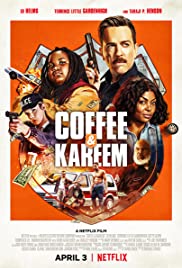
COFFEE AND KAREEM
US, 2020, 88 minutes, Colour.
Ed Helms, Taraji P.Henson, Terence Little Gardenhigh, Betty Gilpin, Ron Reaco Lee, David Alan Grier.
Directed by Michael Dowse.
This Netflix comedy was released in the early months of the coronavirus lockdown and was very popular.
Basically, it is the story of a less than common-sensed police officer, Coffee, Ed Helms, who is the target of criticism by his superiors. The opening of the film shows him ruining a police set up. He is in love with Vanessa, Taraji P.Henson, who has a quite incorrigible son, played by Terence Little Gardenhigh. He is called Kareem – eventually the cream in the policeman’s coffee! He is a strong screen presence, very large in build, with dreadlocks and quite a mouth!
Kareem resents his mother’s relationship with Coffee and goes to visit some thugs, drug dealers to get rid of Coffee. The thugs are interrogating a policeman about deals and money – and one of them carelessly shoots him. Kareem has been taping everything.
This begins a frantic chase, Kareem wanting to avoid Coffee, yet Coffee trying to bond with the boy. The action is a kind of madcap violent chase, eventually Vanessa being abducted. While Coffee and Kareem clash, they are thrown together in a whole lot of situations and begin to bond, not without some difficulties.
It is then revealed that the police superior (Betty Gilpin) and her boss (David Alan Grier) are both corrupt and in on the drug dealing. However, one of the gang is a would-be dentist and would-be singing artist who is persuaded to be on the side of Coffee and Kareem.
Needless to say, after a huge shootout between the corrupt police and the Canadian drug dealers, there is a happy ending.
One of the difficulties for some audiences will be the incessant coarse language, especially coming from Kareem. He is also ultra-precocious and there is some shock realisation of this in his frank and crude talk about sex and sexual relationships and sexual behaviour. Which means then that a lot of the film is very vulgar, to say the least, and a lot of the comedy is crude and crass. But, this is a reminder, of popular standards by 2020, especially from the United States where there was a kind of prudish attitude towards sexuality and swearing in free to air television.
Published in Movie Reviews
Published in
Movie Reviews
Saturday, 09 October 2021 13:01
Touched with Fire
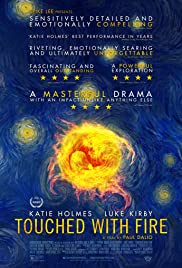
TOUCHED WITH FIRE
US, 2016, 103 minutes, Colour.
Katie Holmes, Luke Kirby, Christine Lahti, Griffin Dunne, Bruce Altman.
Directed by Paul Dalio.
Initially, this project was called Mania Days. It was a special project of writer-director, Paul Dalio, who based the screenplay on his own experiences of bipolar mania, time in institutions. He is also skilled at rap poetry and brings us into the action.
This is a story of Marco, alienated from his father (Griffin Dunne), resenting that his mother, also suffering mental issues, disappeared from his life. He imagines that he is an alien, is caught up focusing on the sky, moon and stars, with echoes of Van Gogh. This is also the story of Carla, a poet, living away from her concerned parents (Christine Lahti and Bruce Altman), having published a book, but concerned about what caused her bipolar situation and confronting a doctor at the institution.
This brings the two characters together, initial antagonism, leading to better understanding, leading to bonds of affection and love. They participate in night sky watching and are asked to leave the institution. They set up by themselves, go on many dates, but arouse the wariness of the parents. There is also the issue of going on and off their medication. With the confrontations, they decide to leave, stealing Carla’s mother’s car, driving across the United States, pursued by the police and then driving into a river.
Carla is pregnant and the couple set out to prepare for the birth, painting the child’s room in Van Gogh colours and design. The parents set up meetings, especially with doctors, to the anger of both Marco and Carla.
Marco is not on his medication, attacks Carla who returns to drinking. He sets up a party for her but there is a revelation that she has had an abortion.
The film comes to a conclusion a year later with the two of them coming together for a poetry book reading, appreciating each other, but then parting.
Paul Dalio studied with Spike Lee who is the executive producer of this film.
1. The title? The book by the woman who experienced bipolar, took medication, recovered and wrote the book? The meeting with Marco and Carla? (The initial title of the film, Mania Days?)
2. A sympathetic portrait of a man and a woman, bipolar? The film based on the experiences of the writer-director, his experience of illness, institutions, and the capacity for rap poetry? Dramatising his life, experience and insights?
3. The New York setting, homes and apartments, streets and landmarks? Hospital, group meetings, wards, rooms? The cross-country travel? The musical score?
4. The introduction to Marco? The effect of the bipolar condition, from another planet, obsessed with the moon and stars, with Van Gogh? His rap poetry? Ability to rap on any word? His relationship with his father, resentment about his mother’s leaving, her illness?
5. The introduction to Carla, the poetry reading, the restrained reaction? Her visit to her mother, the bonding with her mother, her mother’s concern? Her father?
6. Each of them going to see the doctor, the interviews, their condition? Marco and his commitment? Carla and her demanding her documents, self-commitment?
7. The meetings, Marco in his forthrightness, upsetting the man obsessed by the Apocalypse? Marco wanting to be direct? Carla and her reaction? Challenging him to rap? His success? His reaction to her problems, discovering the book by her?
8. The meetings, the discussions, the diagnoses of the doctor? Her explanations?
9. The growing bond between the two, the attraction, at night, out with the stars? The authorities and their reaction? Wanting to separate them?
10. Their leaving the institution? Setting up together? A future or not? The bond, the shared experiences? Leading to Carla’s pregnancy?
11. The reaction of the parents, the visits, the confrontations, the concern?
12. The couple escaping, taking the mother’s car, the lyrical drive across the countryside, the police and the pursuit, Marco driving into the river? Their escape, return to New York?
13. The setting up house, preparing for the baby, the painting of the walls in the van Gogh style? Marco and his enthusiasm, not taking his medication? Carla being careful, but then drinking? The book of poems for the baby? The argument, Marco pushing Carla, reaction? His picking up the pieces of the book?
14. The parents, arranging the meeting, their turning up, the doctors – and the couple escaping?
15. The issue of being on medication, taking it, not taking it, the repercussions?
16. Marco and the birthday party, the parents, the gift of the book, his estimation of the past, from another planet, now wanting the baby to be born in reality? Carla and the abortion? The break between the two?
17. The year later, the poetry reading, the sharing? And their parting?
18. Audience experience of the mania days, the bipolar experience, understanding, empathy, even those experiencing bipolar mania or not? Medication, cure, hope?
Published in Movie Reviews
Published in
Movie Reviews
Saturday, 09 October 2021 13:01
Undercover Grandpa
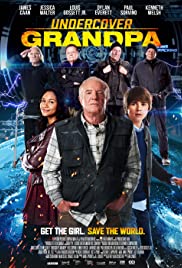
UNDERCOVER GRANDPA
Canada, 2017, 94 minutes, Colour.
James Caan, Dylan Everett, Greta Onieogou, Jesse Bostick, Kenneth Welsh, Paul Sorvino, Laurence Dane, Louis Gossett Jr, Jessica Walter.
Directed by Eric Canuel.
As the song says, they’re either too young or too old! This is particularly relevant for the impact of this film. Older audiences identified with the comic characters and enjoyed the film. Younger audiences identified with the younger characters and the adventure. Some of the comments from those in between were highly dismissive as if the film were intended for an adult audience.
In one way, this is like a computer game plot. It is highly unrealistic – but made momentarily plausible given the characters and their backgrounds. Anyone who expected this to be realistic story does not understand fantasies.
Jake (Dylan Everett) is an ordinary teenager, likes sketching one of the girls in class, Angie, Greta Onieogou, – and she agrees to go out on a date with him. In the meantime, Jake has forgotten that the evening meal is the monthly visit from his grandfather, ex-military man, who lives in a retirement village. His grandfather is full of tall stories. He is played genially by James Caan.
The film gets the opportunity to show that grandpa was not entirely wrong. The girlfriend is abducted, a central European dictator has been attacked in public but has engineered this for his own escape. Grandpa goes to the authorities, especially the officer in charge, Jessica Walter, with whom he had a past relationship. She dismisses the story. However, she gets information from 911 that it is true.
Grandpa goes to visit his old military friends, a group of eccentric, highly eccentric experts who are in their mid-70s and living in the past. They include Kenneth Welsh, Louis Gossett Jr, Lawrence Dane, Paul Sorvino.
The film shows the group drawing on their abilities, their past resources, using their military skills to little avail, grandpa however saving the day.
It is all very likeable and enjoyable if taken as a PG rated blend of The Dirty Dozen and Going in Style.
1. The target audience? The old? Identifying with the characters? The young and their identifying?
2. The city, school, sports, classes, student meeting, home, meals, the party? Ordinary life? The musical score?
3. Jake and his story, his parents, grandpa coming to the meals and telling the seemingly exaggerated stories? Jake at school, sketching Angie, the reaction of the teacher, friendship with Wendell? And she agreeing to go on a date? The anxiety of the meal? Taking grandpa home? The phone call, and his disappearance?
4. Grandpa, all his stories, inventing all kinds of things including KFC, not getting royalties? His hypothesis about Angie? Going to the authorities, encountering Maddie, their past relationship? Her not believing him? The 911 call? As stealing her phone? Maddie and the authorities about the attempted assassination? Her wanting grandpa to solve everything, his getting out, with Jake?
5. The truth about the abduction, Angie witnessing the shootings, going into the plant?
6. Grandpa, going to see his old friends, Harry and his wireless setup, old-fashioned, but Wendell able to use it? Wolf, the priest, the woman in the house, weapons? Mother, past operations and ingenuity? Giovanni, weapons? The group in their mid-70s?
7. The operation, each with their own task, the failure and then being caught? Grandpa, his ingenuity, infiltration, confrontations? The international war criminal and his having studied grandpa’s work, admiration for him?
8. Angie, using her skills, Jake meeting up with her, getting out of traps?
9. The old men and using their skills surprisingly? Grandpa and the final confrontation? Jake and Angie and their success?
10. Maddie arriving, confident that grandpa would solve everything? The pretence that he was dead, he and Maddie going to Mexico, cover?
11. Enjoyable make-believe?
Published in Movie Reviews
Published in
Movie Reviews
Saturday, 09 October 2021 13:01
Crossword Mysteries: A Puzzle to Die For

CROSSWORD MYSTERIES: A PUZZLE TO DIE FOR
Canada, 2019, 90 minutes, Colour.
Lacy Chabert, Brennan Elliott, John Kapelos, Barbara Niven, Victor A.Young.
Directed by Don Mc Cutcheon.
First in a series of Crossword Mysteries, Canadian productions but New York set. They introduce crosswords expert played by Lacy Chabert. With her skills, she notices that that there are clues to a number of robberies indicated by particular crosswords. While she pursues her investigations, with the help of her aunt, Barbara Niven, the detective on the case, Brennan Elliott, initially does not see any value in the clues. Needless to say, after another murder, he listens more sympathetically. He is also encouraged by his father, the police chief, John Kapelos.
The story is set in an affluent New York society, the world of art galleries and agents. The setting also has an advanced crossword competition and festival.
If one puts one’s mind to analysing the suspects, it is not difficult to spot who will turn out to be the murderer. On the other hand, there is a suspicious couple, avoiding any publicity, wanting to avoid being photographed – and nice twist that they are not the criminals but are in witness protection.
This is a popular television film, light undemanding entertainment.
1. The title, expectations? Murder?
2. The title, expectations? Murder? The detectives and investigation? Tess Harper, her crossword expertise, clues, investigations, dangers?
3. The New York setting, affluent, newspapers, crossword departments, crime reporting, detective work? Art galleries? Social events? The crossword competition? The musical score?
4. Tess, her personality, skills, at the paper, her relationship with her aunt, using her for social contacts? Harris, friendship, working together? His investigations? His murder? The discussions with Logan, his lack of interest, her perseverance, clashes, bonds, his beginning to listen? His father? Tess and her interviews, with the wife of the dead gallery owner?
5. Crosswords, clues, compositions, the rally, Pierre and his giving up the leadership, Tess taking over, Pierre and his charming manner? The meetings, preparations, the rally, crosswords and tests, the competition? Tess and the setting of the sailing competition crossword? Tess and her realisation about Pierre, his being the brother of the dead gallery owner, the newspaper and photos, Harris discovering this? His visit to the dead man’s wife, information? Pierre, the confrontation with Tess, saying he did not want to harm her?
6. The thief, the surveillance, the time framework of the death? Tracking down the thief, the interviews, his following orders, the clues and the crosswords?
7. An enjoyable blend of crime, detection, unmasking a criminal, with an up-and-down romantic relationship?
Published in Movie Reviews
Published in
Movie Reviews
Saturday, 09 October 2021 13:01
Sniper: Legacy

SNIPER: LEGACY
US, 2014, 95 minutes, Colour.
Tom Berenger, Chad Michael Collins, Doug Allen, Dominic Mafham, Mercedes Mason, Dennis Haysbert,. Nestor Serrano.
Directed by Don Michael Paul.
Tom Berenger first appeared as Thomas Beckett, the top Sniper, in the film of 1993. It was popular but the sequels did not come until eight years later. Berenger still appeared. However, some years later, the series continued with Beckett’s son, Brandon, played by Chad Michael Collins. He appeared in four of these films (Berenger appearing in the last two) which were designed for video release.
This film opens with an assassination attempt by a sniper in Berlin, continues with action in Syria, Brandon and his companion, Sanaa, Mercedes Mason, shown with skill in their eliminating the enemy. Yet, Brandon has second thoughts and wants time out. He participates in another action and then his father reappears. A reunion, but forgetting the inadequate fathering by Thomas Beckett.
The opening assassination attempt leads to information that one of the participants in a special Afghan operation has had a breakdown and is killing off those who participated in the action. He concentrates on Beckett but confronts Brandon. Ultimately, there is a showdown.
Dennis Haysbert is in the supporting cast as the colonel who has slipped off the radar in a Greek island. In the end, the action comes to him.
This episode should satisfy fans of the Sniper series.
1. The popularity of the Sniper films? Start in 1993 – continuing for more than a quarter of a century?
2. The films made for straight to video release? Quality of photography?
3. The history of the series? Tom Berenger in the 90s and early 2000? Training, skills, in action? Older, his disappearance, reappearance, in action? Making contact with his son? Poor father? Strong military commander?
4. The range of locations? Berlin, Greek Islands, Syria and Turkey? The beauty of the photography? The musical score?
5. The initial action in Syria, Brandon and Sanaa, snipers working together, Reese and his companion? The convoy, the targets, the shooting, deaths?
6. The American presence in Syria? Turkish bases? Bidwell, tough stances, attitude towards Brandon, the other snipers? Reese and his fight with Brandon? Brandon wanting to leave, not going with the squad to confront the arms dealers, his confrontations along the way, tough, his position as sniper? The action, his ability? Sanaa
and the others?
7. The opening in Berlin, the meetings, Simpson and his setting up the rifle, the death? The background story of the Afghan involvement? His killing all those involved? Arrival in Syria and Turkey? The killing of the last member of the group?
8. Beckett and his reappearance, age, bonding with his son, Bidwell and the situation, explanations? His meeting with his son, the focus on action rather than regrets about the past?
9. The setting up of Simpson? His fight with Brandon and challenging him and his father? The sniper set up, the ammunition? Bidwell and Sanaa and firing? Simpson getting the better of Brandon? Beckett shooting him twice?
10. The colonel, retired, in Greece? But still controlling situations? Beckett meeting him, the shooting and attack on him? His being wounded?
11. Brandon, his future, wanting time off, his father in command? Further sequels?
Published in Movie Reviews
Published in
Movie Reviews